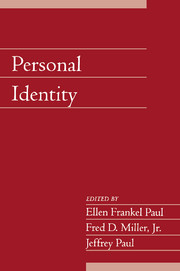Book contents
- Frontmatter
- Contents
- Introduction
- Acknowledgments
- Contributors
- Experience, Agency, and Personal Identity
- When Does a Person Begin?
- Persons, Social Agency, and Constitution
- Hylemorphic Dualism
- Personal Identity and Self-Ownership
- Self-Conception and Personal Identity: Revisiting Parfit and Lewis with an Eye on the Grip of the Unity Reaction
- The Normativity of Self-Grounded Reason
- Rationality Means Being Willing to Say You're Sorry
- Personal Identity and Postmortem Survival
- “The Thing I Am”: Personal Identity in Aquinas and Shakespeare
- Moral Status and Personal Identity: Clones, Embryos, and Future Generations
- The Identity of Identity: Moral and Legal Aspects of Technological Self-Transformation
- Index
When Does a Person Begin?
Published online by Cambridge University Press: 05 July 2014
- Frontmatter
- Contents
- Introduction
- Acknowledgments
- Contributors
- Experience, Agency, and Personal Identity
- When Does a Person Begin?
- Persons, Social Agency, and Constitution
- Hylemorphic Dualism
- Personal Identity and Self-Ownership
- Self-Conception and Personal Identity: Revisiting Parfit and Lewis with an Eye on the Grip of the Unity Reaction
- The Normativity of Self-Grounded Reason
- Rationality Means Being Willing to Say You're Sorry
- Personal Identity and Postmortem Survival
- “The Thing I Am”: Personal Identity in Aquinas and Shakespeare
- Moral Status and Personal Identity: Clones, Embryos, and Future Generations
- The Identity of Identity: Moral and Legal Aspects of Technological Self-Transformation
- Index
Summary
I. Introduction
The answer to the question “When does a person begin?” depends on what a person is: If an entity is a person, what kind of being, most fundamentally, is she? Since the persons we are familiar with are human persons—persons with human bodies—one may simply assume that what we human persons are most fundamentally are animals. I agree that it is often useful to think of us as animals—as long as we are thinking biologically, rather than ontologically. However, on my view, our animal nature, which we share with other higher primates, does not expose what we most fundamentally are. Ontology is not a branch of biology.
Nevertheless, my account of human persons roots us firmly in the natural world. Biologically, we are akin to other primates; but ontologically, we are unique. However, we are still material beings. I believe that we are fundamentally persons who are constituted by human organisms. Since constitution is not identity, human persons may come into existence at a different time from the organisms that constitute them. So I shall argue.
Unfortunately, this area of inquiry is clouded with terminological difficulties. The term “human being” (as well as “human individual”) is used ambiguously. Some philosophers take “human being” to be a purely biological term that refers to human organisms. Others take “human being” to name a psychological kind, not a biological kind.
- Type
- Chapter
- Information
- Personal Identity , pp. 25 - 48Publisher: Cambridge University PressPrint publication year: 2005
- 3
- Cited by

